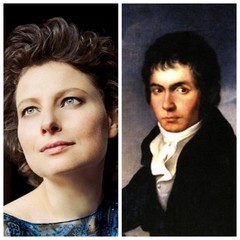|
Back
Noble Prize Peaces New York
BargeMusic
10/07/2022 -
Ludwig van Beethoven: Sonata No. 17 in D Minor “Tempest”, Opus 31, No. 2: 1. Largo-Allegro – Sonata No. 15 in D major “Pastoral”, Opus 28: 1. Allegro – Sonata No. 31 in A‑flat Major, Opus 110
Talia Amar: Into the Maelstrom (World Premiere)
Artur Akshelyan: Let Me Be a Scarlet Flame... (World Premiere)
Carolina Noguera-Palau: De Adoración y Espanto (World Premiere)
Yael Weiss (Pianist) 
Y. Weiss/L. van Beethoven
“A call for inward and outward peace.”
Ludwig van Beethoven, from “Dona nobis pacem”, Missa Solemnis
“A great poet is the jewel of a nation.”
Ludwig van Beethoven
Was it a coincidence? Or Providence? Less than 24 hours after the Nobel Peace Prize, American-Israeli pianist Yael Weiss presented part of her own Noble Piece prizes around a theme by Ludwig van Beethoven. The composer himself was a truculent, narcissistic, nasty man. Yet in his music–most notably the Missa Solemnis, the Ninth and several sonatas–he understood a kind of tranquility which could be broadened out to embrace a world. And that was even more astonishing, considering that in his time, war was considered a noble calling, an adventure for aristocrats off the battlefields, while their vassals and peasants were fodder for cannon.
Have we changed at all since the early 1800’s? No, it’s become only worse. Yet Ms. Weiss, a noted international pianist, has done her part in broadening the German/Austrian composer for the world. As for peace in the world, I don’t have the slightest belief that either Beethoven’s Missa Solemnis or John Lennon’s flaccid Give Peace a Chance stand a chance against the gun‑makers, the gun‑runners, the demagogues or those historical fascists who vow to bring back their idea of worldly paradise by killing those not like themselves.
Yet in her way, Yael Weiss had done her part by commissioning bagatelles from composers who a) come from war‑torn countries and/or b) take Beethoven as their model. Ms. Weiss is curator of a project which either has or will have asked composers to base their work on all 32 Beethoven sonatas. As an accomplished artist herself, she is performing these world premieres with sections or (in one work last night) full sonatas.
In one way, this is unfair. No matter how accomplished were her three composers last night, even taking allowance for their different centuries, none could compare with even the opening measures of the Beethoven. In other sense, the three composers could broadcast the agonies of their own nations.
Israeli composer’s Into the Maelstrom was dedicated by Ms. Weiss to the people of southern Israel and the Gaza Strip who “share a deep love for the same land.” Nothing particularly pointed to Jewish or Arabic themes here, but one heard in the incessant repeated notes, in the fortissimo chords and the faint melodies, that this was a work of war...and peace.
Armenian composer Arthur Akshelyan’s Let Me Be a Scarlet Flame... referred to the ongoing war between Azerbaijan and Armenia–basically a war of Islam and its proxies and a Christian religion. It is one of the most savage wars of our time, yet largely forgotten. Mr. Akshelyan offered momentary relationships to the war with several moments of Armenian and Turkic scales. It was a short yet very touching work.
The final commissioned work, Of Adoration and Fear was by the Colombian composer Carolina Noguera‑Palau. From the start, we knew that this was a Latin American composition. The accents were broadly rhythmic, one felt an energy, a dynamism, a velocity which breathed–if not war or the titulary “adoration and fear”–as the work of a woman who was never afraid to bring in the heat and velocity of her own country.
Ms. Weiss played these works with a sympathetic sincerity, and was equally at home with the three Beethoven selections. One felt disturbed that both “The Tempest” and “Pastoral” Sonatas were truncated. But in the complete A‑flat Major Sonata, she was at lyrical and bold. Most essential of all, she showed that Beethoven’s impulsive changes, his sudden mood swerving and final fugue–an iconic paean to the piano–were so singular that no other interpolated music possibly rival his Promethean vision.
Harry Rolnick
|